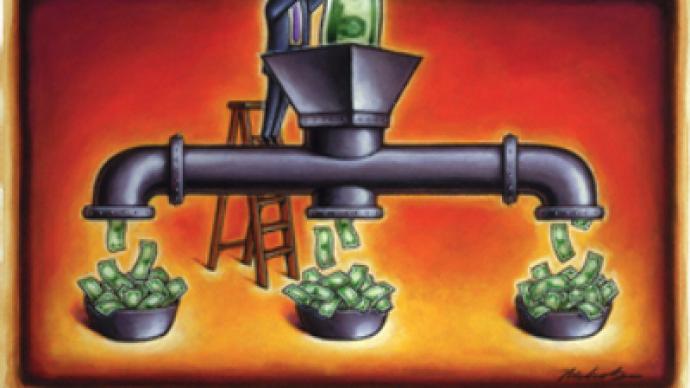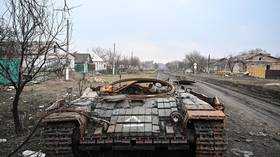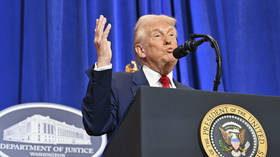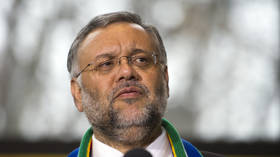Talking banking in a time of crisis: Nikolay Kascheev, MDM Bank

With the global banking system in turmoil RT spoke with Nikolay Kascheev, Head of Economy and Foreign Exchange Research at MDM Bank in Moscow for a closer look at how the Russian banking system is coping.
RT: A number of recent commentators and analysts have recently suggested that it is almost impossible for Russian companies to raise money abroad in the current environment. How is this changing the way Russian companies (particularly major Russian companies) need to operate, and how they need to organize their financing?
“Many experts assert that borrowers from Emerging Markets will most probably be cut off from the global capital markets, for at least this year at best. It seems very much like this, with risk aversion being the dominant culture for the time being.
Local markets also seem to be solely opened to top tier borrowers solely, with the Rouble markets remaining closed completely until the devaluation stops. Companies' financing need to be carried out in ‘emergency mode,’ and turning mainly to the local market for funds. There they are finding that there are scarce funds on offer, and that where they are on offer they face very high interest rates.
Exporters are in a somewhat better position, and discount retailers as well, probably. However, all imminent borrowers should evidently seek contacts with the state, try to join state-run programs or deal with state-controlled banks. They may rely on their own funds also, if they have such. They should renegotiate their existing obligations, cut their costs as sharply as they can. There are tough times ahead for all of us.”
RT: Globally, interbank rates are showing some signs of returning to normal (pre crisis) levels. How are Moscow interbank rates reacting?
“MosPRIME stays high, while USD/RUB NDF implied yields stay skyhigh. The keyword has been devaluation. The Central Bank of Russia (CBR) run ”smooth devaluation“ has already sucked many funds from the banking system, the latter boosting its international reserves to $160 Billion. So, the lack of Rouble liquidity, which is coming almost entirely from CBR short-term funding facilities, along with continuing high devaluation expectations, is keeping the MM rates above a 10% threshold – and above 20% during the tax paying period. The relative alleviation on global markets isn’t helping Russian companies because generally they are unable to tap them for cash.”
RT: Is the maneuvering of the Central Bank, to manage a devaluation of the Rouble, complicating financing for Russian companies? How?
“As the CBR pursued its policy of ”the smooth devaluation“ there were hardly any other attractive ways to invest money than playing with forex. Given NDF IY staying more than 50%, and real sector and interbank risks being unsustainable, the entire banking system – and its clients – turned to currency speculation, despite verbal interventions by the Central Bank demanding banks to keep their USD longs within a certain quantitative framework. Currently, the situation has not changed too much despite the CBR having announced its intention to end the devaluation by setting the upper limit of its ”dirty float“ corridor at RUB 41 per basket. The CBR still needs to prove its firmness yet, as well as its ability to withstand the ongoing turmoil.”
RT: Russian bonds and corporate debt are historically cheap. At what point do you anticipate this will become attractive to foreign investors? What implications do you think this has for Russian equities?
“Yes, it is cheap, but in the current environment not many people care. Global risks are very obvious, and risk aversion remains essentially high all across the globe. However, local players are already buying first-tier Eurobonds, although mainly short-term ones, and very selectively. As to international investors, they have much more attractive assets to consider in terms of risk/reward ratio in OECD economies that have also become very cheap on their own scale. I believe, that 2009 is a lost year for emerging equity in general.”
RT: The banking system has been under considerable stress, with the government intervening to ensure its stability through both liquidity injections and buyouts of smaller banks and brokerage houses. Are you expecting it to have to undertake more steps than it has done so far?
“In my opinion, ideologically, turning to the demand side of the economy would be a wise step for the authorities in their fight against the crisis. That is, issuing State orders to industries would be more effective than bailing out banks and pumping liquidity into the system forever. Banks should be consolidated before their capital is boosted by the state – the Russian banking system remains very fragmented, featuring an excessive number of microscopic banks. And this is a problem to be resolved fast.”
RT: What is your long term outlook for the Rouble?
“I think that the Rouble will stay low for a long time, with no signs of material appreciation foreseeable (vis a vis the EUR+USD basket). The recent events on the global arena entail a sobering view on many things, including emerging markets, and Russia in particular. The recent strengthening of the Rouble over the 2006 to 1H2008 was not unique in any way in the EM domain, and was very much due to hot money flowing in. Now this flow has ceased. However, an appreciation of USD/RUB rate is quite possible – whenever global inflation is back, the oil price jumps due to previous underinvestment, and the dollar devalues again globally either vs. majors or even emerging currencies.”
RT: Over what timeframe do you expect the full effect of the Rouble devaluation we have had to start generating a positive effect for the Russian economy?
“I, personally, do not consider devaluation as an inevitably positive phenomena. I'm glad to be finally able to say that I'm not the only one to say so. Indeed, I think that devaluation might be especially harmful in the current environment, when the recession is really global, unlike in 1997-1998. There is no guarantee this time that the economy will get a jumpstart, nor even that Russia will gain some ephemeral advantages in international competition. Everybody is devaluing this time and global demand remains weak. The devaluation might be just a chance to reload the system, while the strategic effect might be negligible – as it was in fact after 1998, when the chance to change the previous economic paradigm was lost, leaving Russia in the same unbalanced state economically.”
RT: Looking at global currencies, do you foresee major changes in the values of global currencies such as the US dollar and the Euro?
“A month ago everyone was saying that the EUR/USD rate would fall to 1.1 or even to parity. I am not so sure. I think that the implications for the EUR/USD rate of an imminent dollar oversupply has been underestimated, while European pain has been stressed way too much. In addition, when everybody starts talking a strong appreciation, a currency usually corrects downwards soon, and vise versa. Nevertheless, in the short to mid run it looks like it's still the time for the USD.”
With Maria Dadasheva, James Blake













